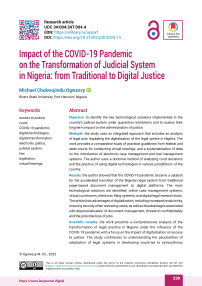Impact of the COVID-19 Pandemic on the Transformation of Judicial System in Nigeria: from Traditional to Digital Justice
Автор: Ogwezzy M. Ch.
Журнал: Journal of Digital Technologies and Law @lawjournal-digital
Статья в выпуске: 3 (2), 2025 года.
Бесплатный доступ
Objective: to identify the key technological solutions implemented in the country’s judicial system under quarantine restrictions and to assess their long-term impact on the administration of justice. Methods: the study uses an integrated approach that includes an analysis of legal acts regulating the digitalization of the legal sphere in Nigeria. The work provides a comparative study of practical guidelines from federal and state courts for conducting virtual hearings, and a systematization of data on the introduction of electronic case management and trial management systems. The author uses a doctrinal method of analyzing court decisions and the practice of using digital technologies in various jurisdictions of the country. Results: the author showed that the COVID-19 pandemic became a catalyst for the accelerated transition of the Nigerian legal system from traditional paper-based document management to digital platforms. The main technological solutions are identified: online case management systems, virtual courtrooms, electronic filing systems, and digital legal research tools. The article lists advantages of digitalization, including increased productivity, ensuring security when reviewing cases, as well as disadvantages associated with depersonalization of document management, threats to confidentiality and the potential loss of jobs. Scientific novelty: the work presents a comprehensive analysis of the transformation of legal practice in Nigeria under the influence of the COVID-19 pandemic with a focus on the impact of digitalization on access to justice. The study contributes to understanding the peculiarities of adaptation of legal systems in developing countries to extraordinary circumstances through the prism of technological innovations. The author developed the concept of the relationship between the judicial system’s digital transformation and ensuring the constitutional right to a fair trial under the social distancing. Practical significance: the study results can be used to improve the legal framework for the legal sphere digitalization in Nigeria and other developing countries. The conclusions are important for shaping policy in the field of modernizing judicial systems, developing ethical standards for virtual legal proceedings and creating effective mechanisms for ensuring access to justice in the digital age. Practical recommendations can be applied by judicial authorities to optimize the processes of administration of justice and to improve the quality of legal services.
Access to justice, court, COVID-19 pandemic, digital technologies, digital transformation, electronic justice, judicial system, law, legislation, virtual hearings
Короткий адрес: https://sciup.org/14132942
IDR: 14132942 | УДК: 34:004:347:004.4 | DOI: 10.21202/jdtl.2025.14


